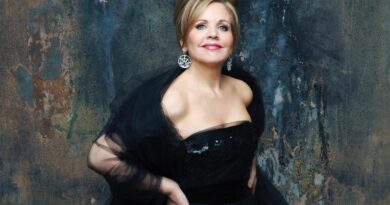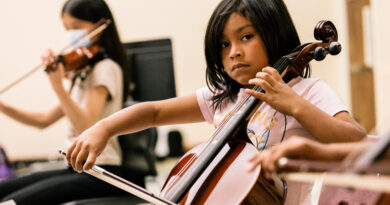LUMINARY: Q&A with Singer/Songwriter Camila Meza
Chilean jazz musician Camila Meza is well-known for her fresh improvisations and her intuitive blending of voice and instrument in a seamless outpouring of music. Ever since the musical upstart left Chile for New York in 2009 to attend the New School for Jazz and Contemporary Music, she has grown more and more influential as an artist of rank. Almost immediately, she became a regular at jazz clubs in the Big Apple, and as such etched out a reputation of superlative mastery of both voice and guitar, something rare in the jazz world. And as a composer and arranger, she’s developed a voice that embraces both jazz and Latin American traditions, something that is clearly expressed in her recordings for Chilean record label Vertice Records. Having performed in South American, Europe and the US, Meza is already becoming a veteran on the global circuit. She’s performed at the Blue Note of Poznan in Poland and the Swindnica Jazz Festival. She’s graced the stages of the Bern International Jazz Festival in Switzerland and was invited to perform at Bogui Jazz in Madrid.
Q. For such a well-rounded artist, Meza still embraces a sense of wonder when she has an opportunity to perform with legendary performers like Peter Bernstein, Vic Juris, Sam Yahel, Barry Harris, Vijay Iyer and Cassandra Wilson.
A. I had a chance to discuss the whirlwind that is her burgeoning career with the artist in advance of what was to be aspring performance at Harris Theater before statewide shutdowns cancelled their schedule. What I found was an artist at once in touch with her place in the field that has embraced her so completely and yet clearly in awe of her own evolution as an artist and the shape her career will yet take.
Q. What and who were your earliest inspirations growing up in Santiago?
A. I grew up listening to all kinds of music. My dad listened to The Beatles and a lot of classical music. I discovered Jimi Hendrix and fell in love. Then Björk came into picture and soon after jazz guitarists like Pat Metheny and George Benson.
Q. And what was it that inspired you to travel to New York to study?
A. The vibrancy of New York’s music scene. I spent about a month during the summer of 2008 in New York, checking out every club and going to two or three concerts a night until the wee hours of the morning. I couldn’t believe how much great music was being made everywhere and at all times. It was one of the most inspiring experiences I’ve had. I applied to go to school in New York (The New School) the day I returned back home to Chile. School was the perfect place for me: arrive at a place where I could become a better musician, immediately meet aspiring young musicians while being blocks away from where all the good stuff was happening (in the village.
Q. What was it like for you to begin playing in some of New York’s most prestigious Jazz clubs shortly after making your way to the Big Apple?
A. Nerve-racking and amazing. I remember early in 2013 I had the chance to perform for the first time leading my band at Jazz Standard and a week later as part of Fabian Almazan’s band at The Village Vanguard. I was so nervous, one morning I woke up with a back pain I couldn’t move. I overcame the mental stress and enjoyed every bit of those performances as if they were the last ones. So many incredible things happened that week. I met my manager, the producer of my album “Traces” and just confirmed I was on the right path.
Q. Tell me how the New York Jazz scene has helped to shape your music and your career?
A. The amount of creativity and artistic diversity that the city holds, from a high density of extremely talented musicians and artists, makes you constantly be motivated. If one day you are not feeling inspired, you just go out, listen to your friends play and you’re back on track. It also serves as a mirror for growth… like a teacher that won’t let you cheat. You have to go through that self discovery and soul searching to find the deepest meaning and truth in your art making.
Q. How do you balance a reverential approach to jazz standards with an openness to new ideas and influences so well represented in your music?
A. I tend to think of music as having a fluid nature. There’s a beautiful film called “Latcho Drom” about the travel of Romani people from India all the way to South Spain (portraying the conception of flamenco) and how this movement influenced their music and how their music influenced the traditional music of the places they passed through. I find it fascinating how the interchange of cultures can create so much beauty. I’ve always had that mindset, to study the tradition, to know what came before me, and let the channel open to keep the branches growing.
Q. Has touring so widely in recent years come to impact your approach at all?
A. It has made me more conscious of my time. We spend sometimes so many hours getting to a gig, and the gig is just a little fraction of it, it has made me develop a more focused practice and constant well-being routines.
Q. Tell me what it was like working with Fabian Almazan on his project and the Blue Note/Artist Share recording.
A. Such a joy! Fabian is my hero. He’s one of those people that you can’t understand how they can do/know so much and do everything at the highest level. He’s a super hard-working musician and artist, super attentive to detail. His music is full of that attention… and really challenging! I don’t think he purposefully does this, but he’s always writing outside the box. He hears music in his head with a complex beauty that really gets me. He’s also an incredible band leader, with a clear vision but that allows the voices in his band to express themselves.
Q. Tell me about the process of recording Traces. What were the album’s influences and was the process cathartic having broken through in New York’s competitive music scene?
A. Traces was like the culmination of a long process of trying to answer some of the biggest questions in life. The now cliché “finding myself” was such a strong motif in the making of this album. It started with one song – the first song I wrote after years of not daring to write because of self-doubt. And little by little, these songs started popping up like flowers after a long winter. I let myself go in regards to how my songs should sound and started accepting my intuition and my personal taste. So something new came out of that process. It was definitely cathartic! I’d say there’s a lot from early music loving years: Led Zeppelin, Björk, Spinetta, Victor Jara, Brazilian music, Jazz, Folk.
Q. Has your music evolved at all since you began writing?
A. Yes. My earlier songs (dating back more than a decade), they contain this element that I describe as “trying too hard”. I guess is a sign of immaturity and I appreciate having gone through that phase to be able to see it clearly now. Today’s writing mostly revolves around being able to offer a message in its most pure and essential way, so if that means that I have to play just one chord the whole song, I’ll go for it. No longer trying to be “hip” (laughing)
Q. How has the COVID-19 pandemic impacted your work musically, pragmatically, or otherwise?
A. Wow… definitely a big deal. I think all artists right now, we’re in an ocean of uncertainty. If you’re mainly a performer, your work vanished from the face of the Earth until… we don’t know. It’s making me reshape certain things but also it’s allowing me to do things I wanted to do for a long time and hadn’t got the chance. I haven’t felt inspired to write but I feel that slowly I’m coming out of that cocoon and becoming musically creative again.
Q. Tell me what’s next for your career?
A. I’m applying for grants to be able to record an album that will contain all the music I wrote for a Jazz Gallery Commission I did in 2019. It’s called ‘Portal’ and I’m looking into collaborating with visual artists to make it an audiovisual album. The music is quite cinematic and there’s a storyline that runs through the whole piece, so would be a cool challenge to have it be an interdisciplinary effort.
Q. How do you enjoy your time away from the concert stage?
A. I know this is probably the most common answer to this question, but I’ve gotten really good at cooking (laughing). I’ve also been researching more into other things that interest me: herbal medicine, Ayurveda and psychology.
Q. What is your favorite dessert?
A. Vegan cheesecake! I found a recipe made with cashews, dates and walnuts… insane.
Q. When is the best time of day for you to write music?
A. It varies. But I’d say late afternoon is a good moment for creation for me.
Q. Where would you most like to be stranded for a week and why?
A. In a cabin in the middle of a forest in front of a lake! That’s my idea of peace.




